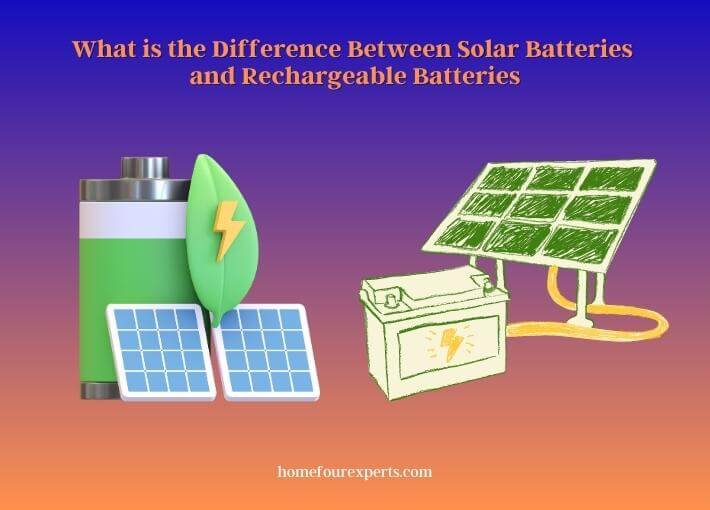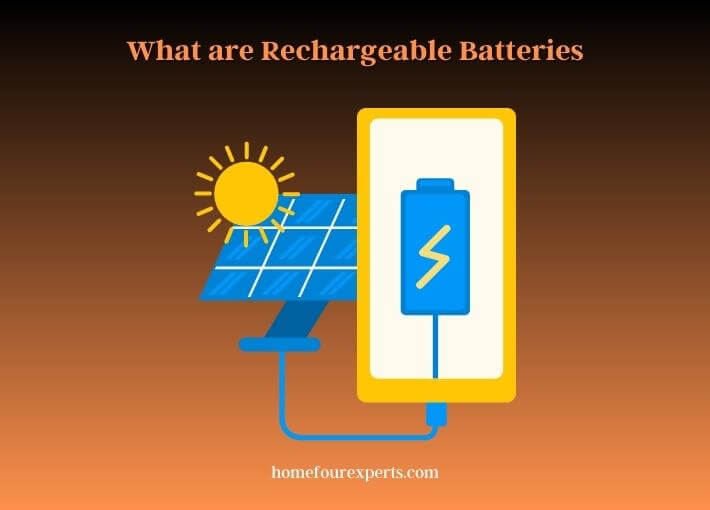With the growing concern for the environment and the need for sustainable sources of energy, solar power has become a popular alternative to traditional fossil fuels. Solar energy is generated by harnessing the power of the sun through solar panels, which convert sunlight into electricity. Storing this energy for later use is equally important, and this is where solar batteries come in.

Solar batteries are an essential component of solar energy systems, as they store excess energy generated by the solar panels during the day for use when the sun is not shining. These batteries help provide power during periods of low sunlight, such as at night or on cloudy days and reduce the reliance on the grid. This makes solar energy systems more independent and cost-effective in the long run.
Solar batteries are often confused with rechargeable batteries, which are commonly used in portable electronic devices. While both types of batteries are designed to store energy for later use, there are significant differences between them.
What are Solar Batteries?
Solar batteries, also known as solar energy storage systems, are designed to store energy generated by solar panels. They are used to provide power when the sun is not shining, such as during the night or on cloudy days. Solar batteries are typically connected to a solar panel system and store excess energy for later use.
If you want to know whether are generators better than solar panels? Click here to know the answer.
What are Rechargeable Batteries?
Rechargeable batteries, on the other hand, are a type of battery that can be recharged and used multiple times. They are commonly used in portable electronic devices such as smartphones, laptops, and cameras. Unlike disposable batteries, which are designed to be discarded after use, rechargeable batteries can be reused multiple times, making them a more sustainable and cost-effective option.

The Difference Between Solar Batteries and Rechargeable Batteries
| Solar Batteries | Rechargeable Batteries |
| Designed for use in solar energy systems | Designed for use in portable electronic devices |
| Larger in size and capacity | Smaller in size and capacity |
| Deep cycle batteries with a long lifespan | Often made with lithium-ion technology, with a shorter lifespan |
| Require a charge controller for optimal performance | Typically charged through a wall outlet or USB port |
| Can store energy for use during periods of low sunlight | Used to power devices on the go |
| May require professional installation | Can be easily replaced by the user |
| More expensive upfront cost, but can save money in the long run | Less expensive upfront cost, but may need to be replaced more frequently |
| Often come with warranties | May not come with warranties |
Solar batteries and rechargeable batteries serve different purposes and are designed for different applications. Solar batteries are ideal for those who are looking to power their homes or businesses with solar energy, while rechargeable batteries are a more practical choice for those who need to power portable electronic devices on the go.
Benefits of Solar Batteries
Energy Independence
Solar batteries allow homes and businesses to become more independent from the grid. With a solar battery, excess energy generated by solar panels can be stored and used during periods of low sunlight, such as at night or on cloudy days. This means that homes and businesses can rely less on the grid and become more self-sufficient.
Cost Savings
By using a solar battery to store excess energy, homeowners and businesses can reduce their reliance on the grid and ultimately save money on their energy bills. In addition, the cost of solar batteries has been decreasing in recent years, making them a more affordable option for many people.
Environmental Benefits
Using solar energy and solar batteries is an environmentally friendly alternative to traditional fossil fuels. Solar energy is a renewable source of energy, meaning it can be used indefinitely without depleting natural resources. By using solar batteries to store energy, homeowners and businesses can reduce their carbon footprint and help mitigate the effects of climate change.
Increased Energy Security
With a solar battery backup system in place, homeowners and businesses can ensure that they have access to power even during power outages or emergencies. This can be especially important in areas prone to natural disasters or other emergencies.
Long Lifespan
Solar batteries are typically designed to last for many years, with some models lasting up to 20 years or more. This means that homeowners and businesses can rely on their solar batteries for long-term energy storage and savings.
Benefits of Rechargeable Batteries
Rechargeable batteries have become increasingly popular in recent years due to their many benefits. Some of the key benefits of using rechargeable batteries include:
Cost Savings
While rechargeable batteries may have a higher upfront cost than disposable batteries, they are more cost-effective in the long run. Rechargeable batteries can be recharged and used multiple times, which means that they can save money in the long term compared to disposable batteries that need to be replaced frequently.
Convenience
Rechargeable batteries are often used in portable electronic devices, such as smartphones, cameras, and laptops. By using rechargeable batteries, users can avoid the hassle of constantly purchasing and replacing disposable batteries. This can be especially convenient for those who frequently use their electronic devices on the go.
Environmental Benefits
Rechargeable batteries are more environmentally friendly than disposable batteries because they can be reused multiple times. This means that they can help reduce the amount of waste generated by disposable batteries. In addition, some rechargeable batteries are made from recyclable materials, which further reduces their environmental impact.
Higher Performance
Rechargeable batteries often have a higher energy capacity than disposable batteries, which means that they can power devices for longer periods. This can be especially important for devices that require a lot of power, such as cameras or laptops.
Compatibility
Rechargeable batteries are designed to be compatible with a wide range of devices, which makes them a versatile and convenient option for many people. In addition, many rechargeable batteries are available in standard sizes, such as AA or AAA, which makes them easy to find and replace.
Environmental Impact of Rechargeable Batteries and Solar Batteries
Both rechargeable batteries and solar batteries have a positive environmental impact compared to traditional disposable batteries. Here’s an expanded section on their environmental impact:
Rechargeable Batteries
Rechargeable batteries have a significantly lower environmental impact than disposable batteries. They can be used multiple times, which means that they produce less waste and reduce the number of batteries that end up in landfills. Many rechargeable batteries are made from recyclable materials, which further reduces their environmental impact.
The production process for rechargeable batteries is also more sustainable compared to disposable batteries. While disposable batteries require a lot of energy and resources to manufacture, rechargeable batteries can be manufactured with a more sustainable process. This helps reduce their carbon footprint and overall impact on the environment.
Solar Batteries
Solar batteries are also an environmentally friendly option for energy storage. They are used to store energy generated from solar panels, which means that they reduce reliance on non-renewable energy sources like coal or gas. This helps reduce greenhouse gas emissions and overall carbon footprint.
Solar batteries can help reduce the strain on the electricity grid during peak energy demand periods. This can help prevent blackouts or brownouts and increase the reliability of the energy grid.
Note It
It’s important to note that the production and disposal of solar batteries can have environmental impacts. The production process requires energy and resources, and some materials used in solar batteries can be hazardous if not disposed of properly. It’s important to properly recycle or dispose of solar batteries at the end of their life to minimize their environmental impact.
Final Verdict
While both solar batteries and rechargeable batteries have their own unique benefits and uses, they serve different purposes and are not interchangeable.
Solar batteries are an essential component of a solar energy system, providing energy storage that allows homes and businesses to become more energy independent, save money on energy bills, and reduce their environmental impact. Rechargeable batteries, on the other hand, are a convenient and cost-effective option for powering portable electronic devices, while also reducing waste and environmental impact.
It’s important to consider your specific energy needs and usage when deciding whether to invest in solar batteries, rechargeable batteries, or both. By understanding the benefits and differences between these two types of batteries, you can make an informed decision that will benefit both your wallet and the environment.
Solar batteries and rechargeable batteries are both valuable tools for reducing energy costs, promoting sustainability, and increasing energy independence. By incorporating these technologies into our daily lives, we can help create a more sustainable and resilient future for ourselves and generations to come.
About This Writer

Hi, I am responsible for the 'Homeowners Power Solutions' category. My name is Liam Jaxon and a licensed technician with 7 years of experience in vehicle batteries, electrical gadgets, and home appliances. My working experience in different residential & light commercial electrical sectors and the automobile industry helped to acquire vast knowledge in this industry.